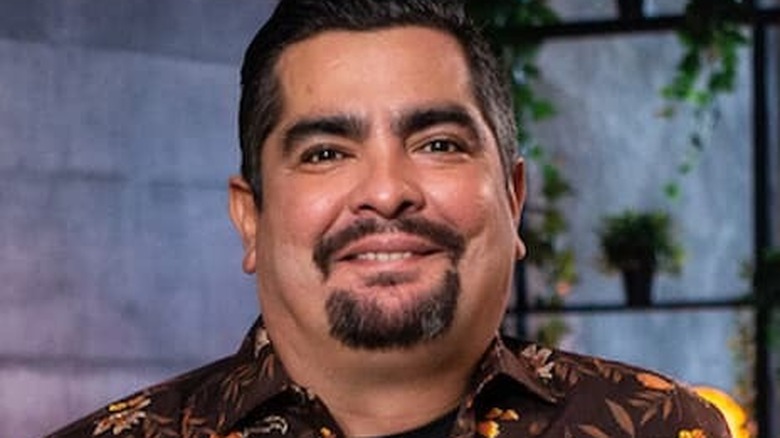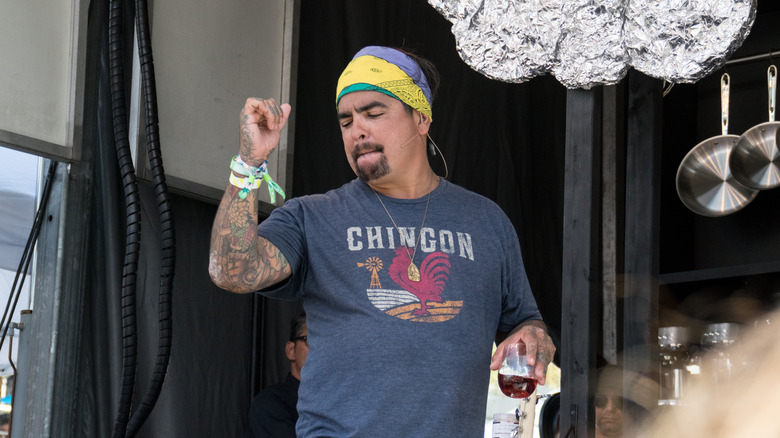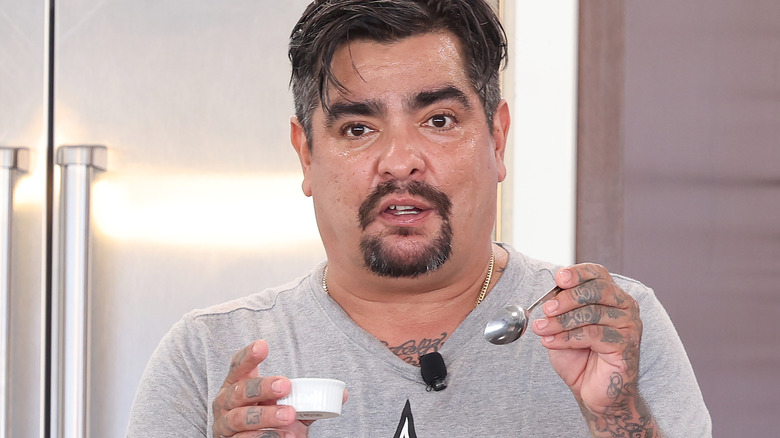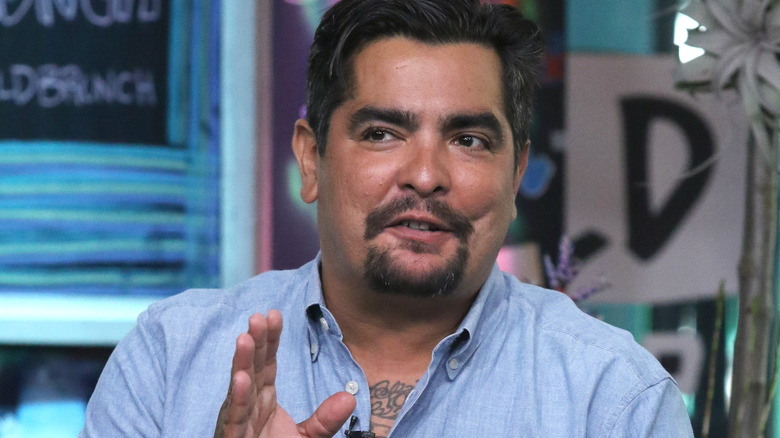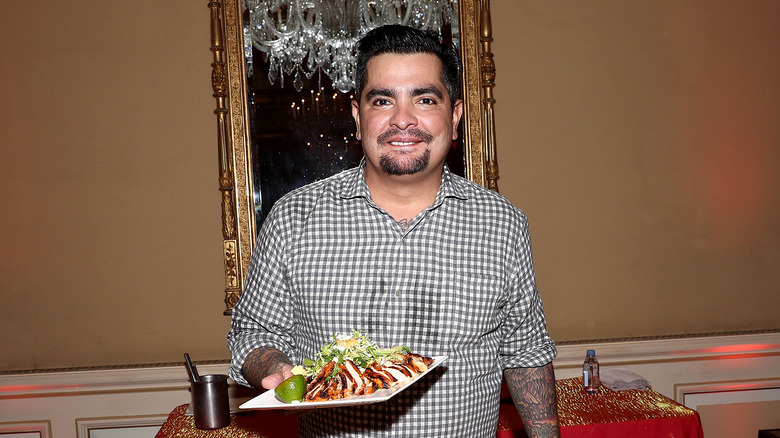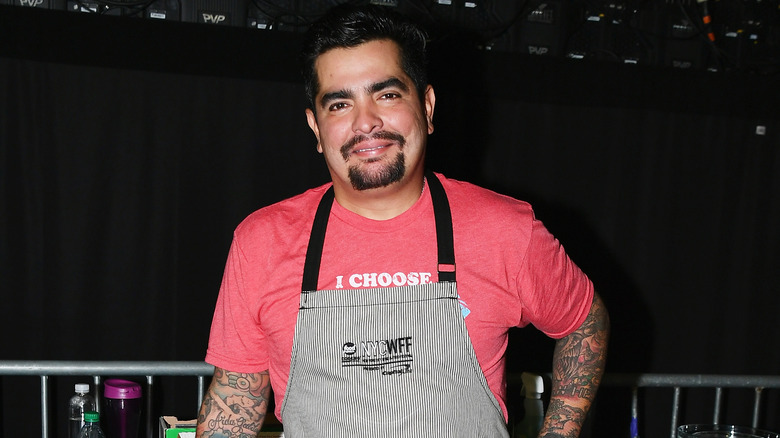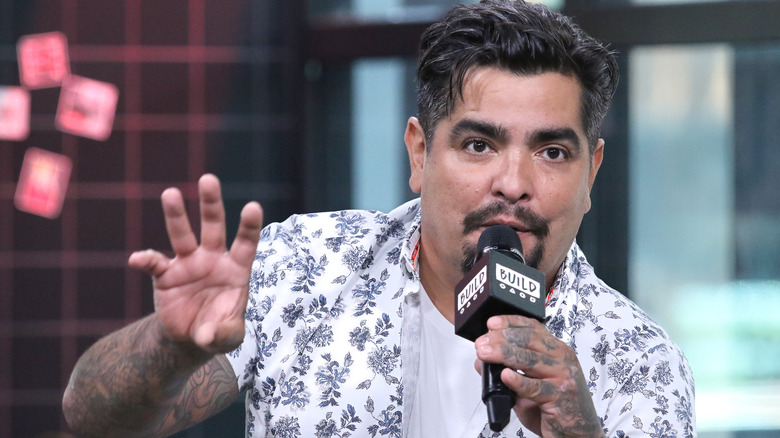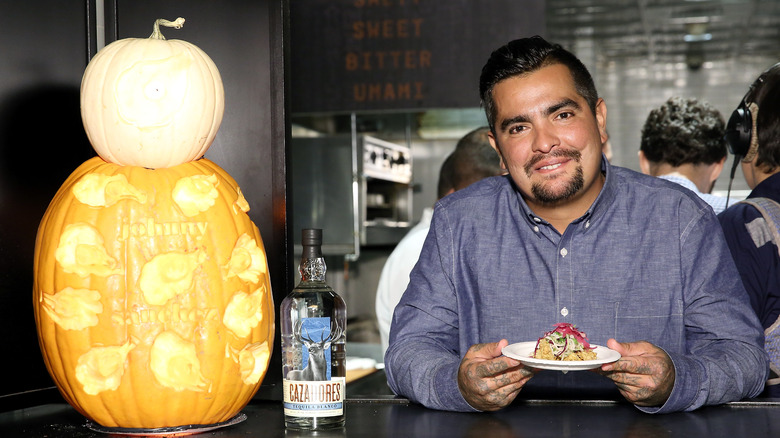Aarón Sánchez Dishes On His New Spanish Language Show, El Sabor De Aarón - Exclusive Interview
Chef Aarón Sánchez has worn many hats during his culinary career. He followed in his mother and grandmother's footsteps (they're both published cookbook authors) to earn success in the food world. According to his website, in addition to owning the New Orleans Mexican restaurant Johnny Sánchez, he's also been a judge or a host on many different cooking shows, from "Chopped" to "MasterChef" and "Taco Trip." The chef has earned acclaim for several of his media ventures. He has received a James Beard Award and a Premio Orgullo Award from the Hispanic Federation.
Now, Sánchez has a new show: "El Sabor de Aarón." It airs on Hogar de HGTV, which is HGTV's Spanish-language channel. It's a competition show, but even more than that, it's a love letter to the various types of cuisine cooked by Latinx people in America. Each episode of this 10-part series features two Latinx chefs cooking against each other head-to-head in good-natured competition. Sánchez sat down with Mashed for an exclusive interview to talk about the new show, his relationship with Latin American cuisine, and his favorite Whataburger order.
Aarón Sánchez talks about the inspiration for his new show and the importance of Spanish food media
What was the initial inspiration for "El Sabor de Aarón?"
I live in a very interesting lens, because I'm bicultural. I'm the perfect example of a Mexican American in the sense that I've been able to hold onto both of my cultures, American and Mexican. I was brought up speaking Spanish as my primary language, living in two different worlds. Then, I wanted to have that synergy and have them collide, and what better way of doing that than through food?
This show is something that really does a great job of capturing what the current Latino diaspora looks like as far as all the diversity and all these different faces from different parts of Latin America who are cooking fantastic food and highlighting them, and letting this show be the jumping-off point in that platform for them to start to get more attention that they rightly deserve.
This show is in Spanish, and you've talked in interviews before about the importance of second-generation Latinx folks keeping their language. Can you touch on why that's so important for you?
I have an 11-year-old son who's starting out in his early years in an immersion school in Los Angeles to try to make sure that he has a grasp of the language. I'll tell you why it's so important, because we all have family members that are in our respective Latin cultures and countries. Then, imagine those summer vacations that you go with your cousins and your nephews, and your aunts and uncles — you're the only one that doesn't speak the language. You feel alienated, and you don't feel you're part of the group. That's one of the big touchpoints that I wanted to emphasize, at least in my family, but that idea of keeping your language is the best way to keep a connection to your culture.
There's a saying in Spanish: "When you lose your tongue, you lose your country." There's a lot of young people claiming that they're Latinos or Latinx, but they're not necessarily speaking the language. That's extremely important.
Do you think that Spanish language food media is going to expand in the US?
Absolutely, because right now, we're living in a very interesting time where you have second-generation Latinos who are desperately trying to rescue their roots and going back for those authentic experiences and those authentic moments. What's going to happen more often is, if someone's struggling with Spanish, for instance, one of the best ways you can learn is either through music, then also through television.
On that medium, I really feel that the food will speak for itself. You're going to understand when I'm talking about a carrot, it's "zanahoria." When I'm talking about onion, it's "cebolla." It's also a really good exercise for people to learn their Spanish and improve on it based on food.
Different types of Latin American food
You talked about how this show is a celebration of the Latin diaspora, and that reflects an incredibly wide range of cuisines. Do you see threads that connect cuisines from places that are far apart, like from Argentina to Cuba?
It's interesting, because how can you delineate, and how can you properly — I don't like the word "classify," but give definition. The way I do it, and the way that I've always navigated Latin America, there's Mexico, which is its own entity, because it's big: 32 states. Then, you have the Caribbean, you have Cuba, the Dominican Republic, Puerto Rico, then you move into Central America, then you have Costa Rica, Nicaragua, El Salvador, Belize, Honduras, all those wonderful places. Then, you have South America, which is this other thing. You have influences from everywhere in the world — from Italy, Spain is the undercurrent in all of Latin America, and there's so much going on. To do a quick little understanding, I break it down into those regions, and it helps people navigate.
When you were selecting contestants for "El Sabor de Aarón," did you try to give a representation of all of those areas?
Yes, as best as we could. It is a struggle based on people's availability. The big question was, "Are we bringing chefs from those respective countries?" The answer was, "No," because we wanted to be able to highlight Latinos from those respective countries, but who are living currently in the States and are doing justice and paying homage to their roots through food, then giving this unbelievable ... Yes, there was a competition element to it, but everyone comes out a winner, you know what I mean? That was important for me.
What are some exciting trends you're noticing? This show is about celebrating traditions, but it also seems it's about cutting-edge trends in Latin cuisine to a certain extent.
I get those questions all the time, as far as what is it in current trends. I'm going to tell you what I think is going to happen. We're starting to specialize in certain parts and elements of those respective cuisines. In Mexico right now, the idea of the Birria taco is taking over. That's a specific example of taking something traditional, like Birria, and making tacos with it and bringing something new to it. There's going to be more of a regional approach to what's going to be happening in the future. I'm going to see chefs and home cooks specializing in certain parts of these culinary superpower countries.
Aarón Sánchez hopes to create a new generation of culinary leaders
Pinging back to the guests you invited, for a long time, it seemed like there weren't very many people of Latinx heritage in food media. You wouldn't see a lot of people who look like you on the food network, or anywhere else on food TV. Are you hoping that some of the people who appear on this show can maybe use it as a stepping stone to more food media fame?
Yeah. That's the deal. I know it's very hip to be Latin and be different right now. That is the reality of things, but I hope that everyone that comes on Discovery Plus, Latino, then HGTV, and all these beautiful outlets that we have, do it for the right reasons. It's not about self-indulgence and using this to have fame or anything. We're trying to create culinary leaders through this. That's my hope. I can't really control how people take this platform and how to utilize it, but at the same time, what we're doing is serious. It's cooking at a high level. If you see our show, you can see how beautiful the food is and how diverse, and their techniques and their background. Their backgrounds are represented on the plates. That's what I really love about what we accomplished.
Circling back to the process of making this show, correct me if I'm wrong, but this is the first thing that COCINA made for TV, right?
You'll have to talk to the COCINA team about that, but I know that we, as a partner in this digital platform, are unbelievably ahead of the curve as far as creating content that is relevant [and] also speaks to the current Latin generations now. That's really cool.
What it's like to make a TV show
Does it feel different doing this thing, where it's your concept? You're the host. You're the face behind it versus previous times when you've been on TV, and it's been somebody else's show.
The biggest part of it is I'm an executive producer on this. I'm a partner in COCINA, who has produced it. There's a lot of that ownership from a creative standpoint, but also from a leadership standpoint. Definitely, the vibe's a little different on this one. I totally feel that, and it's absolutely enthralling and captivating, because it really challenges me and utilizing all my 20 years of television, and be able to apply those lessons that I've learned with an executive producer and on-screen talent.
How has it been working with Hogar de HGTV?
Hogar is awesome. Hogar has been great. What they've gone ahead and done is be able to look at all the different areas of Latin culture and Latin food, and be able to do something special with it. That's really important when you're thinking about how do you continue to grow and touch people in different audiences in the Latin diaspora. Things have changed. Before, it used to be, "All right. Cool. We're going to cater to a Latin grandma." Literally. It was like that.
Now, that is no longer the case. Now, we're talking about young people that are interested in food who have perhaps videoed their grandmas making those traditional dishes. The whole interest level has grown exponentially. We're talking to very different audiences right now. This is what's really exciting to me personally, because the playbook is opened up, and we're talking to grandma, we're talking to mom, and we're talking to the kids. It's really neat. That's why Hogar is such a beautiful landing place for this unbelievable project that we've done.
Aarón Sánchez thinks it's important to be a mentor
Do you feel the pressure of representation or responsibility? You started as an on-camera talent, and now you're also shepherding all of these other people.
Yeah. It's a very good point. I do it in other arenas of my business. I have my scholarship fund, where I put Latino kids through culinary school. I'm very much mentoring in that way. Then, "El Sabor de Aarón" is a form of mentoring, really. We're giving constructive criticism on their food with the hope and the intention that they improve and they get better and find their culinary voice. That is the most important part of this whole exercise, is for them to have the confidence to continue to pursue and persevere, and chase their dreams of being leaders.
I can tell you honestly, the food that we've tasted with my really fun group of peers, friends, and culinary experts that were co-judges with me is spectacular. I really want people to see the quality of the food and the flavor profiles, and every element of their technique. There's so much going on and it's so beautiful for me to see how far Latin food has grown from being cooked at home to a professional setting, and how it's being appreciated and revered. It's really beautiful.
Stories from the El Sabor de Aarón set
Can you say what was one of the best things you ate when you were on set?
Oh, I don't want to do that necessarily, but I can tell you though, we tasted food from Venezuela, plantains being smashed and fried to order. We had unbelievable ceviches that were made with love and inspiration. Yeah, we tasted some really cool stuff. I thought we did a great job of not just being all Mexican. We shot in LA and that's the obvious thing, but we did a really good job of capturing all of this world of Latin culture. We've got to get better, like anything else. There's always room for improvement, and we're definitely striving for that in Season 2.
You've been the judge on a lot of more combative cooking competition shows, like "Chopped" and "MasterChef." How is "El Sabor de Aarón" different?
A lot. I'll give you an example with "Chopped," because you brought it up, but "Chopped" is different in the sense that we have a very brief time with them. It's hard to mentor or to teach in that small abbreviated period. On "El Sabor de Aarón," we have them for a long day. On off time, we're talking about food, they're in the back, going to the market. I'm teaching them things off camera that I've learned that can help them, because again, it's not one of these situations where it's like, we're vying for this amount of money or anything. It's about recognition. It's about celebration of food and culture. It's totally appropriate for me to sit there and teach them a couple of little techniques, then may the best woman or man win kind of thing.
That's a pretty big differentiator from "Chopped." At the end of the day, we're teaching — that's what the word chef means.
Aarón Sánchez's picks for favorite chef, ingredient, and fast-food
Speaking of chefs, who is the one chef that you'd want to cook you dinner, if you could choose?
Gordon Ramsay.
What's one ingredient you could never live without?
Chiles. Chiles or citrus.
That's a tough choice. Not sure if you eat a lot of fast food, but if you do, what's your go-to fast food order, and where is it at?
I have many. I'm a huge Whataburger fan. If you've ever had a Whataburger — and the difference with Whataburger is that most of the other places have that special sauce, which is basically ketchup and mayo with relish in it, and that's usually the sauce — but what makes Whataburger different in the true Texas way, because I grew up in El Paso, it's a mustard-based dressing. That makes a huge difference as far as flavor for me.
You can watch "El Sabor de Aarón" on Hogar de HGTV Thursdays at 9:00 p.m. and on Discovery Familia Saturdays at 8:00 p.m. All times are Eastern.
